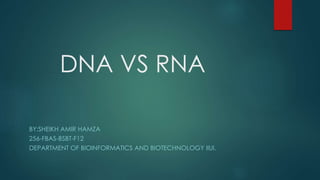Dna vs rna
- 1. DNA VS RNA BY:SHEIKH AMIR HAMZA 256-FBAS-BSBT-F12 DEPARTMENT OF BIOINFORMATICS AND BIOTECHNOLOGY IIUI.
- 2. DNA DNA is a chemical compound that resembles a long chain, with the links in the chain made up of individual chemical units called nucleotides. The nucleotides themselves have three components: a sugar (deoxyribose), phosphate, and a nucleobase ïĩ Adenine ïĩ Guanine ïĩ Cytosine ïĩ Thiamine
- 3. RNA RNA acts as a messenger between DNA and the protein synthesis complexes known as ribosomes, forms vital portions of ribosomes, and acts as an essential carrier molecule for amino acids to be used in protein synthesis. RNA is very similar to DNA, but differs in a few important structural details: ïĩ RNA is single stranded, while DNA is double stranded. ïĩ RNA nucleotides contain ribose sugars while DNA contains deoxyribose. ïĩ RNA uses predominantly uracil instead of thymine present in DNA.
- 4. Question Arises? Why Uracil Instead Of Thymine? OR BETTER YET Why Thymine Instead Of Uracil?
- 5. Molecular Biology of the Cell. 4th edition! ïĩ Currently itâs highly accepted that RNA was the first nucleic acid to exist and that DNA evolved from it, so the changes in the sugar and one of the nitrogenous bases must have some advantage. âRNA stored both genetic information and catalyzed the chemical reactions in primitive cells. Only later in evolutionary time did DNA take over as the genetic material.â
- 6. To Understand! ïĩ Letâs compare cytosine, uracil and thiamine. ïĩ The only difference between uracil and thymine is the presence of a methyl group at the last carbon. uracil thiaminecytosine
- 7. Formation Of Uracil ïĩ Cytosine is readily deaminated, forming uracil. ïĩ This occurs at a rate of 1,000 to 10,000 times per cell per day. ïĩ This altered base is recognized very efficiently by uracil DNA glycosylase (UDG). ïĩ This site is then removed and replaced by cytosine, restoring the DNA back to its original and correct sequence. ïĩ This process of repair is referred to as base excision repair (BER) and is probably the major system responsible for maintaining the integrity of the cellâs DNA.
- 8. Coming To Conclusion! ïĩ Why DNA uses thiamine instead of uracil? ïĩ One reason is to protect the DNA. Methylation of bases protects the DNA by making it unrecognizable to many nucleases enzymes that can break down DNA. ïĩ Also, adding the hydrophobic methyl group changes the shape of the DNA molecule and allows thymine to base-pair only with adenine, whereas uracil would base-pair less selectively. ïĩ If uracil were present in DNA, then the cell would have a difficult time deciding whether the uracil generated from a mutationâthe deamination of cytosine should be there or not.
- 9. Continue! ïĩ Why RNA uses Uracil instead of thiamine? ïĩ Since RNA is shorter-lived than DNA, it can get by with the energetically âcheaperâ uracil. ïĩ A second possibility is that RNA polymerase evolved to prefer uracil so as not to compete with DNA polymerases for thymine in primitive cells (uracil was recognized better by the RNA Polymerase).
- 10. References ïĩ http://www.ncbi.nlm.nih.gov/books/NBK26876/ ïĩ https://earthlingnature.wordpress.com/2012/09/29/why-thymine- instead-of-uracil/ ïĩ http://www.nsta.org/publications/news/story.aspx?id=5260 ïĩ http://www.sciencedaily.com/terms/rna.htm ïĩ http://microbe.net/simple-guides/fact-sheet-dna-rna-protein/










